Contributed by Natalie Sweet
Of Anne’s coronation, we have numerous accounts. Two come from her enemies – Eustache Chapuys and an unidentified witness (whose account found its way into the letters and papers of Brussels) provide scathing commentary and give voice to the supposedly hostile crowds that Anne encountered. Thomas Cranmer and one of the King’s justices, Sir John Spillman, also described the days events, and we have surviving pamphlets that include Nicholas Udall’s verses composed in Anne’s honor. Several years later, the Tudor chronicler, Edward Hall, would provide his own take on the events.
To begin our examination of the records of Anne’s coronation, however, we will first begin with requested favors, costs, and logistics. Numerous persons contacted Thomas Cromwell for the honor of being allowed to create the trappings for the various ceremonies. Robert Tomlynson, the Alderman of Our Lady’s Guild in Boston, wrote that he “endeavoured since to provide such wild fowl as I could get in these parts, i.e. six cranes, six bitterns, and three dozen godwits” for a present to be prepared for the King to present in honor of the Queen’s coronation. Stephan Vaughn wrote to Cromwell with hopes for his wife, saying, “I am informed that the Queen intends to have a silkwoman to trim and furnish her Grace with such things as she shall wear. If you will recommend my wife to the place you will bind us both. You know what she can do. I suppose no woman can better trim her Grace.”
Nothing speaks as much to the pomp and cost of the festivities, however, as the plans described in the Letters and Papers of Henry VIII:
Coronation Of Anne Boleyn.
The order in proceeding from the Tower to Westminster.
The King’s messengers to ride foremost with their boxes, to stay when that time is, and to go when that time is, as they see the followers do pause.
The strangers that ride, and the Ambassadors’ servants. Item, next the trumpets, the gentlemen ushers, the chaplains having no dignity, the squires for the Body, with pursuivants two and two on each side. The knights and challenger and defender with steryng horses. The aldermen of London. The great chaplains of dignity. Heralds, two and two on each side. The knights of the Bath, the “barenettes” [and abbots]. (fn. 3) The knights of the Garter, being no lords. The two Chief Judges and Master of the Rolls. Then all the Lords and Barons in order after their estates. The Bishops. The Earls and Ambassadors. The comptroller of Household. The treasurer of Household. The steward of Household. Two kings-of-arms. The King’s chamberlain. The Lord Privy Seal. The Lord Admiral of England. The Great Chamberlain of England. The Archbishops and Ambassadors. The two esquires of honor, with robes of estate rolled and worn baldric wise about their necks, with caps of estate representing the duke of Normandy and the duke of Aquitain. The Lord Mayor and Garter. The Marshal, the Constable, the Treasurer, the Chancellor. The Serjeants-of-arms on both sides. Her Chancellor bareheaded. The Queen’s grace. The Lord Chamberlain. The Master of the Horse leading a spare horse. Seven ladies in crimson velvet. Two chariots ; two ladies in the first, and four in the second, all of the greatest estates. Seven ladies in the same suit, their horses trapped to the pastron. The third chariot, wherein were six ladies with crimson velvet. The fourth chariot, with eight ladies in crimson velvet. Thirty gentlewomen, all in velvet and silk of the liveries of their ladies. The captain of the Guard. The King’s guard in their rich coats.
“The appointment what number of officers and servitors that shall attend upon the Queen’s grace, the Bishop and the ladies sitting at the Queen’s board in the Great Hall at Westminster, the day of the coronation, as followeth :—
Carvers : Lord Montague for the Queen. Sir Edw. Seymour for the Bishop. Thos. Arundell for the ladies at the board.
Cupbearers : Lord William Howard for the Queen. Lord Clynton for the Bishop. Lord Audeley’s son and heir for the board.
Sewers : Sir Edw. Nevill for the Queen. Percival Harte for the Bishop. Richard Verney for the board. Chief pantry, 1. Chief butler, 1. Chief sewer, 1. Almoners, 7. Servitors, knights, and gentlemen for three messes, 60. Sewers, 8. Servitors, 80. Yeomen, 16.
Knights of the Bath : Marquis of Dorset, earl of Derby, lords Clifford, Fitzwater, Hastings, Mountegle, and Vaux ; Mr. Parker, lord Morley’s son ; Mr. Wynsor, lord Winsor’s son ; John Mordant, lord Mordant’s son ; Fras. Weston, Thos. Arundell, Mr. Corbet, Mr. Wyndham, John Barkeley, John Huddelston, Ric. Verney of Penley, Thos. Ponynges, Hen. Savile, John Germayne, Rob. Whitneye of Gloucestershire, Geo. Fitzwilliams, John Tyndall.
Knights and gentlemen to be servitors : Sir John St. John, Sir Michael Fisher, Sir Thos. Rotheram, Sir Geo. Somerset, Sir Wm. Essex, Sir Antony Hungerford, Sir Ric. Graundfeild, Sir John Hamond, Sir Robt. Painton, Sir Giles Alington, Sir Thos. Elyot, Sir Rafe Langford, Sir John Fulford, Sir Thos. Darcy, Sir John Villers, Sir John Markham, Sir John Beryn, Sir Nic. Stirley, Sir Thos. Straung, Sir Fras. Lovell, Sir Edw. Chamberlen, Sir Adrian Fortescue, Sir Water Stoner, Sir Wm. Barentyne, Sir Wm. Newman, Sir Arthur Hopton, Sir Edm. Beningfeild, Sir Ant. Wingfeild, Sir Geo. Frogmerton, Sir John Russell of Worster, Sir Geo. Darcy, Sir Wm. Pickering, Sir Thos. Cornvell, Sir John Bridges, Sir Wm. Hussey, Sir Edw. Wotton, Sir Wm. Hault, Sir John Skott, Sir Ric. Clementes, Sir Wm. Kempe, Sir Edw. Cobham, Sir Wm. Fynch, Sir John Thymbleby, Sir Rob. Hussey, Sir Chr. Willughbie, Sir Wm. Skipwith, Sir Wm. Askice, (fn. 4) Sir Jeffrey Poole, Sir Jas. Worsley, Sir Thos. Lysley, Sir John Talbot, Sir John Gifford, Sir Wm. Basset, Sir Ph. Dracote, Sir Henry Longe, Sir Ant. Lutterell, Sir John Sainctlowe, Sir Roger Copley, Sir Wm. Pellam, Sir Wm. Goring, Sir Walter Hungerford, John Hersley, George Lyne, Ric. Philips,—Yorke, Ric. Dodham, Rafe Mannering, John Seintler, Clement Harleston, John Turell, Humfrey Ferres, Geo. Grissley, Wm. Drurye, Wm. Cope, John St. John, Edm. Tame, Ric. Lygon, Leonard Poole, John Arnold, John Arden, Wm. Stafford, Chas. Herbert of Troy, Sir Wm. Paunder, Young Wingfeild, Holcrofte, Skipwith, Diar, Young Barkeley.
Sewers : Roger Banbricke, Antony Isley, Edm. Browne, John Cheyne, Wm. Morgan, Davy Morgan, Hen. Seymer, William Jones.
Yeomen ushers and yeomen appointed to attend upon the Queen at her Coronation : John Lane, Laurence Sendell, Robt. Griffith, Thos. Marshall, John Brygden, Davyd Philips, John Geffrey, Wm. Avenell, Ric. Ryder, Wm. Sendre, Hugh Troblefeild, John Ashton, John Smith, senior, John Robertes, John Perce, Antony Saunders, Walter Wagham, Thos. Coxe, Ric. Stone, Thos. Hawkins, Wm. Bond, Robt. Whitbrowe, Hugh Lewis, Thos. Gethens, Ric. Gilmyn, Rob. Gibbes, Ric. Rawneshaw, John Bromfeld, Robt. Langden, John Holcomb, Robt. Owen, Griffith ap Morice, Walter Menours, Wm. Jones, Robt. Mortoun, Edm. Stoner, John Gethens, Edw. Philips, John Wympe, Ric. Clerke, John Holland, John Alcock, Ric. Gilling, John Evanse, Lyonell Martyn, Fras. Coket, John Brathwet, John Cox, John Knotford, John Belson, John Byrte, John Node, Moris Apenevet, Michael Whiting, John Stevens, Hugh David, Lewis ap Watkyn, John Cowper, Edw. Johnson, Ric. Fowler, John Grymith, Symond Symmes, Robert Stonhouse, Edw. Aprichard, Hen. Holden. Ibid., f. 50 b. ii. Officers appointed to attend on the Queen and the Bishop sitting at the Queen’s board end, on the day of her coronation.
John Hancote, Thos. Berram, Roger Gerers, John Massye, John Colby, John Person Edw. Dickey, Ric. Estoune, Wm. Lawry, George Banckes, Thos. Massy, Ralfe Ball, John Gounter, Ric. Baker, John Thomas, Thos. Norton, Wm. Germaine, Thos. Toby, Richard Faice, Geo. Hodson. John Williams, Adam Holland, Robt. Bird, Robt. Gibson, Wm. Batty, Hugh Norres, Thos. Calfe, Wm. Paye.
Carvers : The earl of [Essex or] Rutland for the Queen ; Sir Edm. (Edward) Seymour for the Archbishop.
Cupbearers : Lord Derby for the Queen ; Sir John Dudley for the Archbishop.
Sewers : The earl of Sussex for the Queen ; Sir Thos. Arundell for the Archbishop.
Panters : Viscount Lisle, chief panter ; John Apricharde ; John Gislym.
[Butlers] : Earl of Arundell, chief butler ; Ric. Hill, Edm. Harvye. [Ewers] : Sir Henry [Thomas] Wyat, Jeffrey Villers, Henry Atkinson. Chief almoners for the Queen : Lord Bray, Sir Wm. Gascoyne. Almoners : Henry Wells, Thos. Mason. Edmond Pekham, cofferer. William Thynne. Thos. Hatclife, Edw. Weldon, for the Bishop, and the said Bishop to be served covered. Surveyors at the dressers : Thos. Weldon for the Queen ; Thos. Holden for the Bishop. Michael Wentworth, Henry Bricket, to see that nothing be embezzled.
Servitors from the dressers : For the Queen : Sir — Parker, Sir John St. John, Sir William Wynsor, Sir John Mordaunt, Sir Fras. Weston, Sir John Gifforte, Sir John Barkeley, Sir John Huddleston. Sir Ric. Verney, Sir Thos. Poninges, Sir Hen. Savell, Sir John Germayne, Sir Robt. Whetney, Sir Geo. Fitzwilliams, Sir John Tyndall, Sir Michael Fisher, Sir Tho. Rotheram, Sir Geo. Somerset, Sir Wm. Essex, Sir Antony Hungerford, Sir Ric. Graundfeild, Sir John Shamond, (fn. 5) Sir Robt. Paynton, Sir Walter Stoner. For the Archbishop : Sir Thos. Elyot, Sir Rafe Langford, Sir John Fulford, Sir Thos. Dar[c]y. Sir John Villers, Sir John Markham, Sir John Berryn, Sir Nic. Stirley, Sir Thos. Straung, Sir Fras. Lovell, Sir Edw. Chamberlen, Sir Adryan Fortescue, Sir Hen. Longe, Sir Wm. Barington, Sir Wm. Newman, Sir Arthur Hopton, Sir Edw. Beningfeild, Sir Antony Wingfield, Sir Geo. Frogmerton, (fn. 6) Sir John Russell of Worcestershire, Sir George Dar[c]y, Sir Wm. Pickering, Sir Thos. Cornwall, Sir John Bridges.
Waferers : Rob. Leigh for the Queen and the Bishop. He must bring his wafers for both services to the Queen’s cupboard, to be set (fn. 7) from thence by the sewers. Confectionery : Cutbert Blakden (fn. 8) for the Queen and Bishop, with similar orders.
Kitchen : For the Queen and Bishop : John Plume, Edw. Wilkinson, Ric. Currey, John Armstrong, Robt. Plume, child, Thos. Galepy, fryer.
Larder : Lord Burgenye, John Dale, Jas. Mitchell.
Sausery : John Richardson for the Queen and Bishop, remaining in the house.
Pastry : John Cuncle, Elister Shainc. Boilers : John White, [John Tayler].
Scullery : Wm. Richarde for the Queen ; Wm. Rawlyns for the Bishop, and to be served with gilt plate.
Marshals : Ric. Rede for the Queen ; Edw. Vaux for the Bishop ; Jesper Terrell ; John Stevens. Richard Chace to be supervisor that every man give his due attendance that shall wait in the hall beneath the bar.
[Lord Chamberlain : John earl of Oxford to give the King water.
The towel : Allen Asplonge, or his heirs, to give the Queen the towel before dinner.
The Queen’s Champion : —.]
Officers appointed to attend on the Lords Spiritual and Temporal at the middle board on the right hand of the Queen. The first board to be 11 yards in length, and to be served with three services of a like fare, and 30 services of another fare.
Sewers : John Barney at the board, John Banbricke at the dresser. Panters : Thos. Bend, Ric. Holbroke, Ric. Madoxe, John Stoddard, Wm. Dennys, Pierce Barly. Buttery and cellar : Bryan Aunsley, William Abbot, Ric. Weckly, John Aman. Ewris : Allyn Matthew, Thos. Christmas, Robt. Clynton.
Almoners : Thos. Oldnall, Wm. Blakeden, Hugh Williams.
[Conveyers] : Thos. Child, Thos. Hinde, Wm. Berman. Surveyors at the dressers : Thos. Hall, Wm. Thynne. John Lane, to see that the yeomen give due attendance. [Servitors from the dresser] : Richard Gilmyn, Robt. Griffith, Thos. Marshall, John Brogden, David Phillip, John Geffrey, Wm. Avenell, Ric. Ryder, Robt. Gibes, Wm. Semerre, Hugh Troblefeild, John Ashton, John Smith the elder, John Robertes, John Perce, Antony Perce, Antony Saunders, Walter Vaughan, Thos. Coxe, Ric. Stone, Thos. Hawkins, Wm. Bonde. Robt. Whitbrowe, Hugh Lewis, Thos. Githens. Waferers : Robt. Lystar. Confectionery : John Amnesleye. Kitchen : Wm. Bolton, Robt. Forster, John Floy (fn. 9) , John Laurence, John Baker, child, Wm. Botte, (fn. 10) fryer. Larder : John Dale, Jas. Michell. Saulsery : John Richard, Symond Dudley. Pastry : John Connicle, Robt. Dauson, Ric. Byre. Boiler : John White. Scullery : Wm. Rice, Wm. Rawlins, Thos. Coke, child, John Worall, (fn. 11) conducte.
Marshals : Thos. Ward, Hen. Hokars. Huisshers : John Gilman, Thos. Myles.
Officers to attend upon Duchesses and other ladies at the middle board on the left hand of the Queen ; the first board 8 yards long. To be served with 3 services of like fare, 3 of another fare, and 30 of another fare.
Sewers : John Bonam, Ric. Sterkey.
Pantry : Thos. Skasley, John Markham, John Coxe, Thos. Hall. Conveyors of the bread to the panters : Richard Boxham, Geo. Forman. Buttery and cellar : Wm. Morrant, Ric. Lee, Ric. Parker, Thos. Trewth. (fn. 12)
[Ewers] : Geo. Fitzgeffrey, John Morgan, John Dixe. [Almoners] : John Stanbanck, Edw. Garret, Thos. Inde, Thos. Walker, Geo. Bond, Wm. Kedle, Thos. Turner. Surveyor at the dresser without, Thos. Hatcliffe ; at the dresser within, Thos. Horden. John Powes to see that the yeomen give due attendance. Servitors from the dresser : Ric. Rainshawe, John Kinge, John Wellet, John Aprice, Ric. Saidell, Wm. Tolley, John Strymyn, Rafe Tykill, Thos. Jones, John Sydnam, Leonard Barowes, John Dorset, Thos. Lewis, Jas. (fn. 13) Stanley, John Tompson, John Smothen, Edw. Deckey, Ric. Eston, Wm. Laury, Geo. Bankes, Thos. Massie, Rafe Baiely, John Gaunter. Wafe[…] Robt. Lyster. Confectioner : John Amnesley. Kitchen : John Dale, George Benson, Rafe Iswell, Wm. Maie, Philip Yarow, child, Ric. Rede, fryer. Larder : Thos. English. Boiler : John Tailour. Saulsery : John Richard, John Ringros. Pastry : Elize Shaunce, Wm. Andreson, conducte. Scullery : Wm. Wells, John Awmorer, conduct, Silvester Glossope.
Marshals : Nic. Sainctes, (fn. 14) Thos. Braken. Huishers : John Towe, Nic. Ashfeild.
Officers to attend upon the Barons of the Cinque Ports, at the side board on the Queen’s right hand, next the wall. The first board to be 8 yards long, and to be served with 3 services of like fare, and 30 services of another fare.
Sewers : Ant. Isley, John Cheyne. Panters : Wm. Cowper, John Bartlet, John Whitstall, Wm. Sotherne, conveyers of bread. Buttery and cellar : John Burnell, Robt. Gardener, Matthew Hanmer, Thos. Stanbridge. (fn. 15) Ewry : Edw. Myller, (fn. 16) Thos. Colbeck, Robt. Maxton. (fn. 17) Almoners : Willm. Cressell, Wm. Breredge, Ric. Valentyne, Thos. Reding, and John Downslowe ; John Davie and Robt. Rendon, (fn. 18) conveyers.
Surveyors at the dressers : Edw. Welden, Jas. Sutton. Servitors from the dresser : Laurence Serle, overseer, John Bromfeld, Robt. Lamdon, John Holcombe, Robt. Owen, Griffith Myres, Wm. Jones, Rob. Orton, Edm. Stone, John Githons, Edw. Philips, John Umpe, Ric. Clerke, John Holland, John Alcocke, Ric. Gilling, John Evans, Lymerell Martyn, Fras. Socket, (fn. 19) John Brewet, John Coxe, John Knotfort, John Bilson, (fn. 20) John Birte. Waferer : Robt. Lyster. Confectionery : John Amnsley. Kitchen : Laurence Thexted, Ric. Townsend, Roger Brosse, John Coke, Rafe Hogan, child, Wm. More, fryer. Larder : Hen. Groves. (fn. 21) Boiler : John Tailour. Saulserie : John Richardson, Matthew White. Pastry : Matthew White, child, Roger Brynge, conducte. Scullery : Wm. Phillip, Wm. Hamhider. Marshal : Ric. Wales. Huishers : John Fisher, Jas. Aleasley.
Officers to attend upon the Mayor of London, sitting at the board next the wall on the left hand of the Queen. The first board to be 9 yards long, and to be served with 5 services of like fare, and 30 of another.
Sewers : Edw. Browne, Wm. Jones. Panters : Thos. Pulfort, Hugh Mynours, John Tryce, Robt. Hylston. Buttery and cellar : Thos. Mynours, Wm. Corffale, caker, John Throughgood, Wm. Agre. Ewry : Edw. Bird, Geo. Smert, Wm. Cheke. Almoners : John Fisher, John Rowland, Wm. Blike, Wm. Willkinson, and Hen. Hungreford ; Adam Faulcet, Hen. Wilkinson, conveyers of bread.
Surveyors at the dressers : John Mery, Robt. Pagman. Servitors from the dresser : Henry Bird to superintend, John Wode, Moris Apdenevet, Michael Whiting, John Stevens, Hugh David, Lewis ap Watkin, John West, John Burton, Robert Fleminge, Edw. Clayton, Lewis Appowell, John Cowper, Edw. Johnson, Ric. Fuller, John Treveth, Simmosune Symes, Robt. Stonehouse, Hen. Holden, John Hancocke, Thos. Boram, Roger Meres, John Massye, John Colby. Waferers : Robt. Lyster, John Amnsley. Kitchen : William Snowball, John Sterne, John Crane, John Mathew, Thos. Borrey, child, Peter Child, fryer. Larder : Ric. Mathewe. Boilers : John White, John Tailour. Saulsery : John Richardson, Thos. Nash. Pastry : Thos. Dover, (fn. 22) Ric. Wilkinson. Scullery : Thos. More, Robt. Cellye. Marshals : Thos. Greves, Wm. Bellingham. Huisshers : Thos. Croftes, Wm. Bate.
The hall must be served with plate, as spoons, salts, pots, and bowls.
The Queen’s Lord Chamberlain and Vice-chamberlain and two gentlemen must attend upon the Queen.
Officers appointed for serving the waste. Panter : Wm. Wilkinson. Clerk : Jas. Harington. Cook : John Hautcliffe. Larderer : John Dauson. Cooks for the “Worchouses” : John Birket, Ric. Parker, John Stevens, John Johnson, Steven God, Wm. Whitfeild.
Noblemen admitted to do service according to the tenure of their lands, and for the trial of their fees and profits unto the morrow of St. John Baptist’s Day : Earl of Arundel, chief butler ; Viscount of Lisle, chief panter ; earl of Oxford, chief chamberlain ; Sir Hen. Wyat, chief ewre ; earl of Shrewsbury to support the Queen’s right arm and bear the sceptre ; sixteen Barons of the Cinque Ports to bear the canopy over her ; lord Burgeine, chief larderer ; Sir Giles Alington to bear the first cup to the Queen ; earl of Sussex, chief sewer ; the Mayor of London to bear a cup of gold to the Queen at her void.

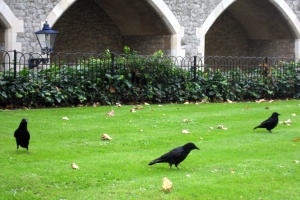

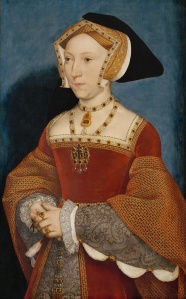

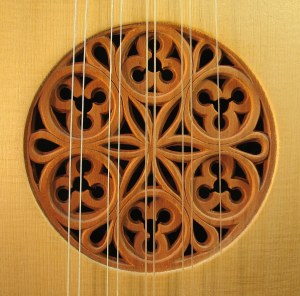
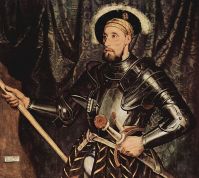
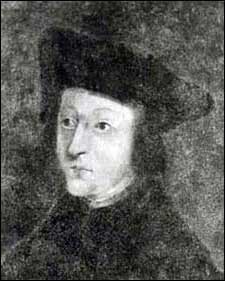
 Purchase The Creation of Anne Boleyn: A New Look at England's Most Notorious Queen (US)
Purchase The Creation of Anne Boleyn: A New Look at England's Most Notorious Queen (US)